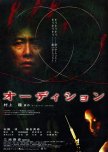The Detonation Of The Rom-Com…
Takashi Miike has long been known for his blood-soaked and violent movies through his legacy left upon Japanese cinema. Therefore it should come as no surprise that his directed psychological-horror ‘ Audition’ (1999) has led to an onslaught of confusion, surprise, intrigue and horror amongst anyone who has watched Miike’s surrealist film.
Based on the novel by Japanese writer Ryû Murakami, ‘ Audition’ ‘s seeming basic plot-drive could easily be mistaken by the naked eye as a rom-com. Ryo Ishibashi played Aoyama; the middle-aged father and widower who is raising his teenage son Shigehiko (Tetsu Sawaki). Worried about his father Shigehiko suggests that Aoyama should move on and find someone new.
Aoyama soon urged the help from his filmmaking partner Yoshikawa (Jun Kunimara) to film a fake audition for a melodrama as a way of looking for a young and attractive woman. Soon Aoyama seems to have found exactly who he is looking for in Yamazaki Asami ( Shiina Eihi); an ethereally beautiful young woman who is well-mannered and charismatic . However Asami’s perfection soon begins to slip through the cracks as Aoyama stumbles upon darker truths surrounding his seemingly " perfect woman" and her past.
Takashi Miike’s film is tainted with its equilibrated infliction of violence and gore. However unlike many of the director’s previous works which are often soaked in crimson red long before the rolling credits, ‘ Audition’ is a movie which is poignantly self-conscious about its insidious undertones.The notable emotional emphasis upon Shigehiko and Aoyama’s objectification of women early on in ‘ Audition’ has arguably led to a lot of interpretations and mixed-criticism towards Miike’s great contrast between the first-part and second-half of the movie.
Arguably Miike is purposeful within his initial setup of the first part of Audition in equal rendition to a rom-com with the setup and Kunimara’s awkward and flustered micro-expressions around Asami.
Nevertheless even early early on in Miike’s tedious first-part there are hints towards something not being quite right with Aoyama’s dream girl; sitting alone on the floor in an empty apartment, staring at the phone on the ground and all but disappearing after Asami and Aoyama spend the night together. Miike’s clear emphasis upon the expected subservience of women presented a clear critique upon the expectations of Japanese society twisted and morphed into a monstrous reality as the events progress.
However whilst the first-half of ‘Audition’ can arguably be excused as Miike’s presented innocuous romantic fantasy which takes a darker turn in the second half there is an undeniable problem with Miike’s pacing; it is incredibly slow-burn and in parts tedious . Naturally the events are supposed to be gradual but scenes in the first part could often feel dragged out. Overstretched dialogue exchanges could often disengage audiences in parts which whilst necessary often lacked a great ability to coincide with impactful shock and horror amongst audiences by hooking them in the first-part.
However patience is often said to be a virtue. The second-half of ‘Audition’ acts as an enriched reflection of character study where personal traumas and moral, sexual and social boundaries began to blur and frustrations towards gender limitations became more prominent. Aoyama’s fear against women became a reality through Asami became a reality as a sardonic and satirical tone veiled the movie with a boundary where it was hard to truly root for anyone without having to acknowledge the ugly head of the character’s flaws. Reflected in the gradually illusive cinematography techniques which became gradually more vivid throughout this part Miike’s dark irony was perfectly captured in the final part with a shocking twist to its events.
‘Audition’ is a movie which is not for the faint hearted. It is slow-paced and tedious in its initial exposition and whilst failing to arguably wrap up some key points, it is still a movie which unlike many modern horror films understood the impact of suspense and building fear. The cast were were brilliant within their roles and Miike’s emphasis upon themes of gender and limitations disturbingly explode in clear vision for the delivered conclusion of the movie.
Was this review helpful to you?
























